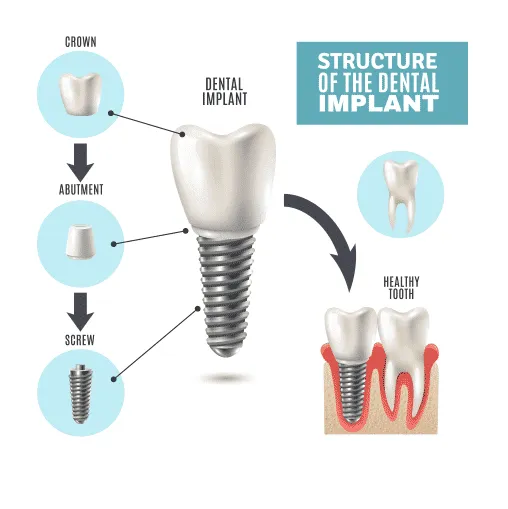Dental Implants Cost
$995/Implant
- OR Finance For:
- 1 IMPLANT + CROWN $73/MO
- Zero-Down, 48 Months, 99% Approved
Dr. Palak Patel Philadelphia’s Award-Winning Implant Dentist

- Permanent solution
- Improved chewing and speaking
- Natural function and look
- Improved facial appearance
- Prevention of bone loss
- No special care required
- Very sturdy and secure
- No diet restrictions
- Can be changed or updated
DENTAL IMPLANT PRICE BREAK DOWN
Includes Treatment Plan, Limited Time Offer
Implant Placement Only. Includes Full Mouth X-Ray
Metal-free Zirconia dental implants are increasing in popularity for a variety of reasons. These implants are known to interact well with the bone and gums, and they are a good holistic option for patients who want an implant that will support their overall health. Many people are choosing Zirconia implants over the traditional titanium varieties. There are several reasons that dental implants’ trend is moving in this direction, including aesthetics, allergies, durability, comfort, resistance, and shorter surgery time.
Same Day In-House Lab Metal-Free Crown
Titanium implants sometimes result in aesthetic issues. This is especially true for patients who experience gum recession or those who have thin gums. When titanium dental implants are put into place, gums can appear gray. Zirconia is white and not a metal, so it can provide for a more natural look.
- $900
The traditional titanium dental implants consist of two metal pieces that are joined together using a fixation screw. When put under extreme pressure, these two pieces can move slightly, and this may result in pockets in which bacteria can colonize. Zirconia dental implants are made from a simple, yet innovative design to eliminate this problem. These ceramic components will not shift after implantation, so infection is less of a concern.
- $5,700
Many patients who choose metal-free Zirconia dental implants claim that they enjoyed a shorter implant process and greater comfort with their system. The strength of Zirconia also allows for greater function after the surgery, so the odds of having long-term success with these dental implants are quite high.
Failed Dental Implants Treatment Philadelphia PA
Despite the many benefits of dental implants, they do have the potential to fail. But what happens if and when they fail? Can you get them fixed? Will you be able to get another implant?
Dr. Palak Patel and his team at PA smile clinic world renowned for their skills in successfully treating patients that are suffering from ‘botched’ dental implant procedures. Many turn to our team after experiencing complications from advanced bone loss, infections, and many other symptoms resulting from prematurely failing dental Implant procedures performed by previously treating Dentists or Dental Specialists.
Signs of Dental Implant Failure
So how will you know if you’re experiencing dental implant failure? Though there can be many reasons a dental implant fails, the symptoms are generally the same. The main symptoms and signs of late and early dental implant failure you should look out for are:
severe pain or discomfort
a loose or shifting implant
swelling or inflammation of the gums
gum recession around the dental implant
difficulty chewing and biting
There is no reason not to have a smile you love, and in the case of failed dental implants, our team of doctors has the solutions for you. At PA Implant Clinic’s Dental Implant Centers, we offer the best implant services dentistry in Roseville, Yuba City, and look forward to opening our newest office in Philadelphia PA.
Dr. Palak and our team are committed to each of our patients and are happy to help you create an efficient plan for your perfect smile. It’s time to gain your confidence back and to show off your teeth. Call our office today for a free consultation.
WHAT ARE DENTAL IMPLANTS?
Permanent solution for tooth loss
How Permanent Are Dental Implants?
The question of how long a dental implant lasts is an important one. You may have heard that the average lifetime of a dental implant is twenty-five years or more. This is true as long as proper care is done to maintain them. Just like your natural teeth, a variety of factors influence their lifetime. These factors include:
How well you follow a regular dental maintenance routine, such as daily flossing, brushing, and seeing a dentist every six months.
Avoid chewing or biting down on hard items, like pen tips or pencils, and avoid opening things with your teeth.
The skill of the dentist that placed the implant. Experts should be certified and knowledgeable of the best practices and be monitoring the process of osseointegration, or how well the implant is connecting to the jaw.
Your lifestyle (such as not smoking or smoking) and overall health.
A dental implant is a support structure anchored in the jaw to strengthen a tooth replacement. This method requires surgery with a substantial level of expertise and cosmetic dental experience. Periodontists who can perform such a procedure are specialized and in high demand in the Philadelphia area. This procedure inserts the implant into the jawbone, where the bone and the implant structure fuse over time. This connection creates an extension of the jawbone which can support and secure a dental prosthetic.

Who would be a Good Candidate for a Dental Implant?
Patients that require dental implants must have good overall dental health. Some factors in deciding whether a patient is a suitable candidate include:
- Gum disease
- Diabetes
- Smoking habits
- Osteoporosis
- The degree of tooth decay
- Supportive jaw bones
- Bone size and structure
- The health of adjacent teeth
- The health of mucous membranes
- The location in the mouth
- Teeth Grinding
Use of bone-building drugs
Incorporating a foreign material into the body can have a high failure rate. To guarantee the most successful outcome of this complex surgery, the patient must meet all essential criteria to ensure the implant will not be rejected.
Dental Implant Procedure
Once the dentist has made molds of the patient’s bite pattern for the tooth bridge or denture, there are five necessary steps required for successful fusion of the implant. The following is a general synopsis of what each patient can expect when undergoing a dental implant procedure.
Incision
After the dentist administers a substantial amount of anesthesia, the dentist will make a deep incision along the center of the gumline, directly above the jawbone. The gum tissue is separated and pulled back to expose the bone underneath. The site of the incision is essential to allow for the gum tissue to wrap around or even cover the implant after insertion.
1st Drilling
The first drill is where a highly qualified dentist is crucial. Dr. Patel will use a high-speed drill to place a tiny hole in the bone. The process requires expertise and precision so the hole does not damage or burn the bone, which could also damage the gum tissue.
2nd Drilling
After the first hole has been created, the dentist will continue to drill at a much slower speed using progressively larger drill bits. When the cavity has reached an optimal size for the implant, the drilling is complete. During this step, careful attention is needed to keep the heat low during drilling to avoid nerve or cell damage.
Dental Implant Placement
The implant is screwed into the hole with a pressure sensitive wrench intended to limit over-tightening or undue stress to the surrounding tissue and bone.
Cavity Closure
Once the implant is screwed into the bone, the soft gum tissue is brought back together to surround the implant either leaving the top exposed or covering it completely. The option between covering the implant entirely or allowing it to pierce through the surface gum tissue depends on the type of prosthetic tooth the will be installed.
What Types of Prosthetics can be Installed onto the Implant?
Once the implant procedure is complete, there are different options of prosthetic types that can be attached to the abutment, a connector to the implant. Dr. Palak Patel and his team located in Philadelphia have several years of experience connecting crowns, dentures, and fixed bridges to implant supported abutments. For multiple tooth prosthetics, the patient may require more than one implant to support the structure. The prosthetic can be further supported by adjacent teeth when anchoring a bridge. This type of bridge is fixed and cannot be removed by the patient. The bridge structure can vary between two prosthetics to a full row, equivalent to a denture. There are also dentures which the patient can remove. These prosthetics have a connector at the anchor points or the abutment itself, allowing the patient to remove the denture easily.
The recovery process can vary between several weeks to months, depending on how quickly the patient heals. The principal goal of cosmetic dentists is to obtain osseointegration with the initial implantation. Osseointegration is the result of the implant successfully fusing to the bone structure, which can occur naturally over time when the implant is inserted correctly and not rejected by the body. The process can take as long as six months to guarantee necessary implant stability. After the implant is secured, the dentist can install a prosthetic tooth, bridge, or denture.
Signs that an implant is securely fused to the bone include a lack of:
- Movement
- Pain
- Bleeding
- Bone loss
The dental implant procedure is not major surgery, but allowing for ample time for the implant to fully fuse to the bone is crucial to a healthy and stable prosthetic. Bone growth is slow but vital to the success of preventing the implant from any movement. Dr. Palak Patel and his team in Philadelphia are committed to their patient’s long-term success, in which every effort is made in the care and stabilization of the dental implant. If you are located in the Philadelphia area and require cosmetic dental work, you will find comfort in the care and precision of Dr. Patel and his staff.
